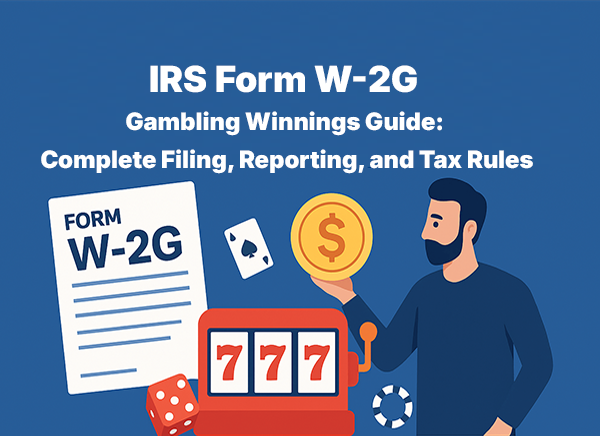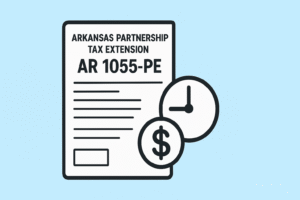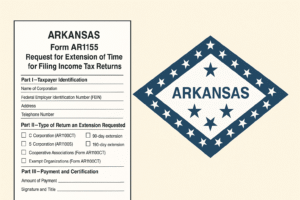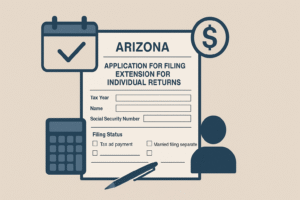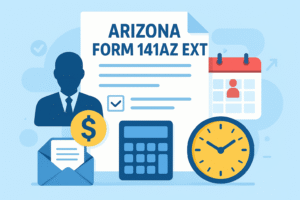Winning big at the casino, racetrack, lottery, or even a charity raffle can be thrilling. But when the excitement fades, there’s an important step many people overlook—reporting gambling winnings to the IRS. If your winnings are significant, you’ll likely receive IRS Form W-2G, Certain Gambling Winnings. This form doesn’t just inform you about the amount you won; it also tells the IRS exactly how much you received, and in some cases, how much tax was withheld.
In this guide, we’ll cover everything you need to know about Form W-2G: who must file it, thresholds, deadlines, line-by-line instructions, penalties, extensions, exceptions, deductions for losses, and reporting rules. By the end, you’ll know exactly how to handle your gambling winnings for tax purposes.
What Is Form W-2G?
Form W-2G is an IRS tax document used to report certain gambling winnings and any federal income tax withheld on those winnings. It ensures both the winner and the IRS have an official record of the payout.
Gambling activities that can trigger a W-2G include:
- Slot machines
- Bingo
- Keno
- Poker tournaments
- Sweepstakes
- Lotteries
- Raffles and drawings
- Horse and dog racing
- Certain sports betting and online gambling payouts
While you may receive a W-2G for specific amounts and game types, remember: all gambling winnings are taxable income, even if you don’t get a W-2G.
Who Must File Form W-2G?
The responsibility to file falls on the payer—usually the gambling operator, such as a casino, racetrack, state lottery, or event organizer.
Payers must:
- Furnish a copy of Form W-2G to the winner by January 31 of the following year.
- File the same information with the IRS by the required deadline.
In some cases, the payer must also withhold federal income tax (known as “regular gambling withholding” or “backup withholding”) and report that amount on the W-2G.
W-2G Thresholds
The IRS has specific dollar and odds-based thresholds for issuing a W-2G:
| Gambling Activity | Threshold for W-2G | Withholding Trigger |
| Bingo or slot machines | $1,200 or more | May require withholding if certain conditions met |
| Keno | $1,500 or more (after wager) | Withholding may apply |
| Poker tournaments | More than $5,000 (after buy-in) | Withholding applies over threshold |
| Other gambling winnings | $600 or more and at least 300× the wager | Withholding applies if odds trigger it |
| Any winnings subject to withholding | No minimum threshold | Always reported |
Example: If you win $650 on a horse race from a $2 bet (325× your wager), you’ll receive a W-2G even though the amount is under $1,200.
Do Casinos Send W-2G to the IRS?
Yes. When a casino (or other payer) issues you a W-2G, they also file the same form directly with the IRS. This means the IRS already knows about your winnings before you file your tax return. If you fail to report it, the IRS can send you a notice adjusting your return and adding penalties or interest.
When Is the Deadline to File W-2G?
- Recipient (winner) copy – Must be provided by January 31 following the year of the win.
- IRS filing deadline –
- Paper filing: February 28 (or next business day if weekend/holiday)
- Electronic filing: March 31
Payers that file 10 or more returns generally must file electronically.
What Information Is Required to Complete W-2G?
The payer will need:
- Winner’s full legal name
- Address
- Taxpayer Identification Number (TIN), usually Social Security Number (SSN)
- Date and type of gambling activity
- Amount of winnings (after wager deduction, if applicable)
- Amount of federal income tax withheld (if any)
- State income tax withheld (if any)
- Payer’s name, address, and TIN
To collect this information, the payer often asks the winner to complete Form W-9, Request for Taxpayer Identification Number and Certification. Without a W-9, backup withholding will apply.
How to Complete W-2G?
Filling out IRS Form W-2G requires precision because it reports taxable gambling winnings directly to both the recipient and the IRS. Even small errors—like a wrong Taxpayer Identification Number (TIN) or miscalculated winnings—can trigger IRS notices or delays.
Before you begin, make sure you have all the necessary details, including the winner’s information, game type, payout amount, and any tax withheld. Using the IRS’s official box-by-box format ensures compliance and helps avoid penalties for incorrect or late reporting.
Box 1 – Enter total gambling winnings (net of wager if applicable).
Box 2 – Federal income tax withheld.
Box 3 – Type of wager (e.g., slot machine, poker).
Box 4 – Regular or backup withholding amount.
Box 5 – Date winnings paid.
Boxes 6–12 – Specific codes or details for certain games (used for IRS processing).
Boxes 13–14 – State or local winnings and withholding amounts.
Payer’s and winner’s information – Include names, addresses, and TINs accurately.
Accuracy is critical—errors can result in rejected filings or IRS penalty notices.
How to File W-2G
The method you choose depends on your filing volume, but deadlines, accuracy, and adherence to electronic filing requirements are key to avoiding penalties.
- Paper filing – Send Copy A to the IRS with Form 1096.
- Electronic filing – Use the IRS FIRE (Filing Information Returns Electronically) system.
The IRS requires electronic filing of Form W-2G if you are submitting 10 or more information returns in total for the year, including all types such as Forms 1099, W-2, and W-2G.
Casinos and other payers must retain copies for at least four years.
Where to Mail W-2G
For paper filing, mail Copy A with Form 1096 to the IRS Submission Processing Center for your state’s region.
| If your business operates in or your legal residence is | Mail Form W-2G to |
| Alabama, Arizona, Arkansas, Delaware, Florida, Georgia, Kentucky, Maine, Massachusetts, Mississippi, New Hampshire, New Jersey, New Mexico, New York, North Carolina, Ohio, Texas, Vermont, Virginia | Internal Revenue ServiceAustin Submission Processing CenterP.O. Box 149213Austin, TX 78714 |
| Alaska, Colorado, Hawaii, Idaho, Illinois, Indiana, Iowa, Kansas, Michigan, Minnesota, Missouri, Montana, Nebraska, Nevada, North Dakota, Oklahoma, Oregon, South Carolina, South Dakota, Tennessee, Utah, Washington, Wisconsin, Wyoming | Department of the TreasuryIRS Submission Processing CenterP.O. Box 219256Kansas City, MO 64121-9256 |
| California, Connecticut, District of Columbia, Louisiana, Maryland, Pennsylvania, Rhode Island, West Virginia | Department of the TreasuryIRS Submission Processing Center1973 North Rulon White Blvd.Ogden, UT 84201 |
What Are the Penalties for Not Filing W-2G?
Penalties depend on how late the filing is:
- Up to 30 days late – $60 per form
- More than 30 days late but before August 1 – $120 per form
- After August 1 or not filed at all – $310 per form
- Intentional disregard – $630 per form (or more for inflation adjustments)
Separate penalties apply for failing to furnish the winner’s copy.
How to Extend the W-2G Deadline
Payers can request an extension to file W-2G with the IRS using Form 8809, Application for Extension of Time to File Information Returns. This generally grants an automatic 30-day extension. However, extensions to furnish the winner’s copy are only granted in special hardship cases, often requested using Form 15397.
Exceptions to Filing W-2G
- Winnings below the threshold and not subject to withholding.
- Winnings paid to foreign persons (reported instead on Form 1042-S).
- Promotional or “free play” credits that don’t have a cash value until cashed out.
Are Gambling Losses Tax Deductible?
Yes—if you itemize deductions on Schedule A. Losses can only be deducted up to the total amount of your reported winnings. You must keep a gambling log with receipts, tickets, or other proof.
How Much Tax Is Already Withheld from Gambling Winnings?
- Regular withholding – 24% of net winnings, applied when the payout meets IRS thresholds.
- Backup withholding – 24% if you fail to provide a valid TIN.
Some states also require withholding, with rates varying by state law.
Backup Withholding
Backup withholding is a tax collection method used when the payer doesn’t have a valid TIN for the winner or is instructed by the IRS to withhold. It applies at 24% for gambling winnings that require reporting.
Do I Have to Report My Gambling Winnings to the IRS?
Yes. All gambling winnings—regardless of amount—must be reported on your federal tax return as “Other Income.” The W-2G simply makes it easier for the IRS to verify your reported amounts.
Conclusion
Form W-2G is more than just a slip of paper—it’s the IRS’s way of tracking large gambling payouts and ensuring taxes are collected. Whether you’re a one-time jackpot winner or a frequent gambler, understanding how W-2G works helps you stay compliant, avoid penalties, and maximize allowable deductions for your losses. Keep accurate records, know your deadlines, and when in doubt, consult a tax professional familiar with gambling income rules.

